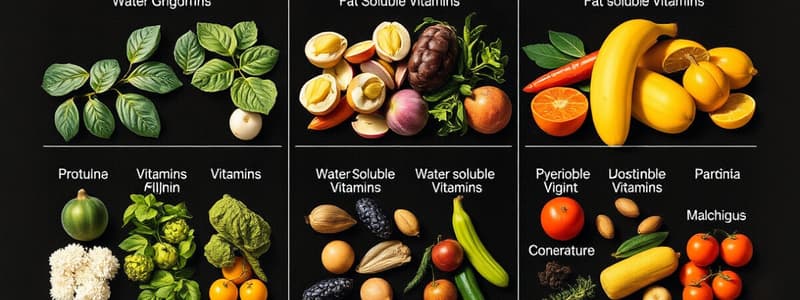Podcast
Questions and Answers
What are the two major classes of vitamins?
What are the two major classes of vitamins?
- Mineral soluble
- Fat and oil soluble
- Fat soluble (correct)
- Water soluble (correct)
What are the water soluble vitamins?
What are the water soluble vitamins?
B complex vitamins, folate, vitamin C
Which vitamins are considered fat soluble?
Which vitamins are considered fat soluble?
Vitamins A, D, E, and K
What are the two types of water soluble vitamins?
What are the two types of water soluble vitamins?
What is non-B complex vitamin?
What is non-B complex vitamin?
What are the three categories of B complex vitamins?
What are the three categories of B complex vitamins?
Which vitamins are classified as energy releasing?
Which vitamins are classified as energy releasing?
What is thiamine?
What is thiamine?
What is riboflavin?
What is riboflavin?
What is niacin?
What is niacin?
What role does folic acid play in health?
What role does folic acid play in health?
What is vitamin B12 also known as?
What is vitamin B12 also known as?
What is vitamin A also known as?
What is vitamin A also known as?
What is vitamin D also known as?
What is vitamin D also known as?
What are the forms of vitamin K?
What are the forms of vitamin K?
What is vitamin E?
What is vitamin E?
Flashcards are hidden until you start studying
Study Notes
Classifications of Vitamins
- Vitamins are classified into two major categories: water soluble and fat soluble.
Water Soluble Vitamins
- Comprised of B complex vitamins, folate, and vitamin C.
- Easily excreted through urine, leading to potential loss in the body.
Fat Soluble Vitamins
- Includes vitamins A, D, E, and K.
- Stored in liver and fatty tissues, allowing for accumulative storage.
- Do not contain nitrogen and are not routinely lost in urine.
- Some can be synthesized by the body, such as vitamin D.
- Support essential functions like cellular physiology, free radical scavenging, clotting, and gene expression.
Types of Water Soluble Vitamins
- Divided into two categories: non-B complex and B complex vitamins.
Non-B Complex Vitamin
- Ascorbic acid, also known as vitamin C, is the primary non-B complex vitamin.
Categories of B Complex Vitamins
- Three main categories: energy releasing, hematopoietic (blood development), and other.
Energy Releasing B Complex Vitamins
- Key vitamins include B1 (Thiamine), B2 (Riboflavin), B3 (Niacin), Biotin, and Pantothenic Acid.
Individual B Vitamins
- Thiamine: Represents vitamin B1, crucial for energy metabolism.
- Riboflavin: Known as vitamin B2, involved in energy production and cellular function.
- Niacin: Identified as vitamin B3, plays a role in DNA repair and energy production.
- Biotin: A B complex vitamin that aids in energy metabolism.
- Pantothenic Acid: Another B complex vitamin essential for energy releasing processes.
Hematopoietic B Vitamins
- Folic Acid: Vital for blood cell development; deficiency can cause megaloblastic anemia.
- Vitamin B12 (Cyanocobalamin): Important for blood development and neurological function.
Other B Vitamins
- Pyridoxine: Also known as vitamin B6, plays multiple roles in metabolism.
- Pyridoxal and Pyridoxamine: Other forms of vitamin B6, contributing to various physiological functions.
Recap of Fat Soluble Vitamins
- Includes vitamins A, D, E, and K, collectively often referred to as ADEK.
Individual Fat Soluble Vitamins
- Vitamin A: Exists in forms such as retinol and beta-carotenes, important for vision and immune function.
- Vitamin D: Known as cholecalciferol, essential for calcium absorption and bone health.
- Vitamin K: Comprises phylloquinones and menaquinones, necessary for blood clotting.
- Vitamin E: Contains tocopherols, acts as an antioxidant protecting cells from damage.
Studying That Suits You
Use AI to generate personalized quizzes and flashcards to suit your learning preferences.



